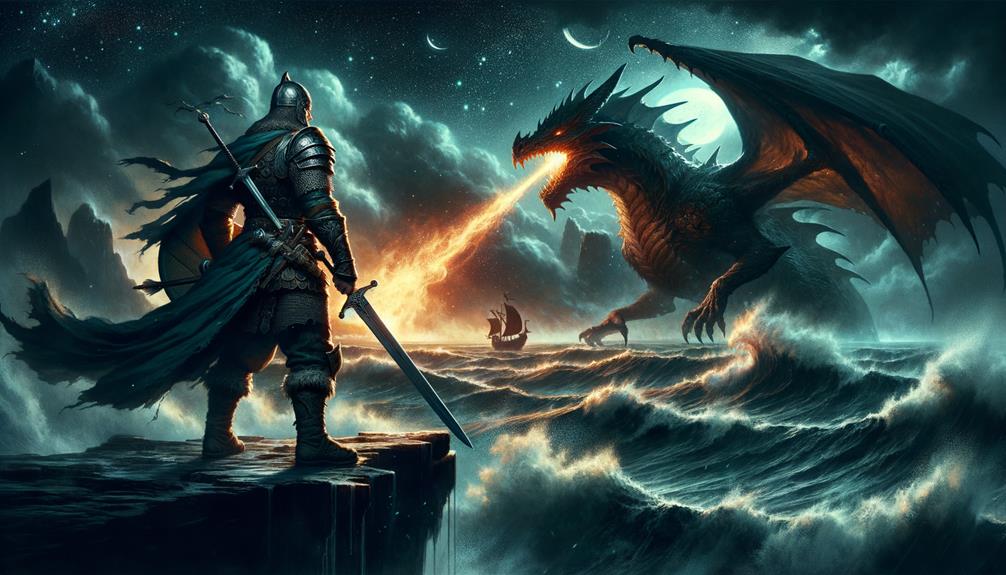The World of Beowulf: An Exemplary Anglo-Saxon Epic Hero
Picture steering through the chaos of a storm-tossed sea on a creaking wooden ship. The waves tower ominously, akin to mythical giants threatening to consume you. Now imagine that ship being your understanding, and the sea being the complex narrative of Beowulf, the quintessential Anglo-Saxon epic hero. A genuine intrigue stems from Beowulf's amalgam of valor, might, and honour, painting a vivid image of the warrior ethos in the ancient Anglo-Saxon society.
Unraveling the Heroic Values of Beowulf
Upon delving into the character and deeds of Beowulf, it's clear he personifies the heroic norms of his era. His narrative echoes the mythological tales prevalent in other cultures, with his character dynamics offering rich paradoxes that warrant further exploration. Our exploration of Beowulf is akin to sailing into uncharted waters, with the promise of unearthing fascinating insights along the way.
Beowulf: More than a Symbol
Far from being a mere symbol, Beowulf is a complex character loaded with paradoxes that demand our attention. His persona serves as a mirror, reflecting the values and traditions of the ancient Anglo-Saxon warrior culture. In the world of literature, he is an exemplar of courage, strength, and nobility, embodying the heroic values of his time.
Embarking on the Journey of Beowulf
Are you ready to embark on this exciting journey into the world of Beowulf, the Anglo-Saxon epic hero? There's a wealth of treasures waiting to be discovered – so let's set sail!
Remember, understanding Beowulf isn't just about memorizing the narrative; it's about immersing ourselves in his world, grappling with the complexities of his character, and gaining insights into the values of the society he represents. So, let's dive in and explore the tumultuous, yet fascinating waters of Beowulf's world.
Defining an Epic Hero

Examining the Epic Hero: Beowulf's Illustrative Journey
A deep dive into the world of *Beowulf* reveals the nuanced and complex definition of an epic hero in the context of an Old English poem. The protagonist Beowulf personifies the qualities of a quintessential epic hero – he's of noble lineage, showcases exceptional strength, exemplifies courage, possesses unmatched warrior skills, and willingly traverses enormous landscapes. Most importantly, he earns the unwavering admiration and respect of his compatriots.
The Noble Lineage of Beowulf: A Key Trait of Anglo-Saxon Heroes
Born into a lineage of kings, Beowulf's noble birth is a significant characteristic that aligns him with the archetypal Anglo-Saxon hero. This detail adds depth to his character, emphasizing his inherent heroic traits and setting the stage for his heroic deeds.
Beowulf's Exceptional Strength and Courage: Heroic Battles Against Monstrous Foes
Beowulf's extraordinary strength and bravery shine through in his hand-to-hand combat with fearsome adversaries like Grendel and Grendel's mother. This isn't just about physical prowess though. Beowulf's victory over a fire-breathing dragon underscores his superior warrior skills, further solidifying his status as an epic hero.
The Adventurous Epic Hero: Beowulf's Willingness to Aid Others
Beyond his homeland, Beowulf's heroism extends as he willingly journeys across expansive landscapes to help others. This trait accentuates his role as an epic hero, setting an example of selflessness and courage.
Admiration and Respect: The Hallmark of Beowulf's Heroism
Above all, Beowulf is highly revered and respected by his people, a clear testament to his heroic stature. His timeless tale, immortalized in the annals of English Literature, serves as a shining example of an epic hero. The narrative of Beowulf resonates even today, illuminating the defining traits of epic heroes – a subject worth exploring for any literature enthusiast.
Beowulf's Heroic Characteristics
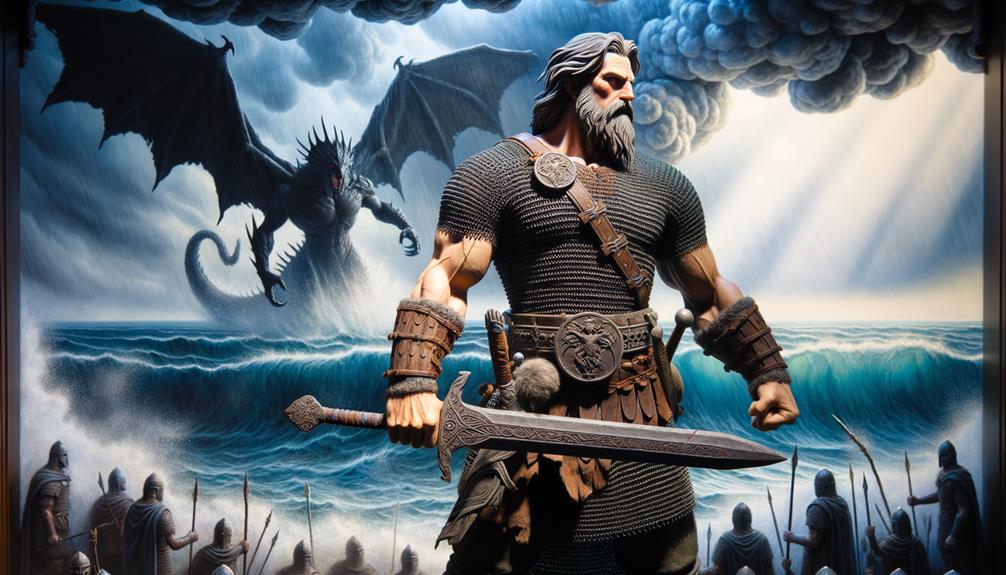
The Heroic Persona of Beowulf: An Exemplary Anglo-Saxon Hero
Delving into the attributes that mold Beowulf into an epic hero, his aristocratic lineage, unmatched might, exceptional martial prowess, venturesome zeal, and the deep reverence he earns from his subjects are unmistakable elements. Beowulf, the courageous protagonist of an ancient English epic poem, perfectly embodies the concept of an Anglo-Saxon hero. He displays a strength equivalent to thirty men when he confronts and defeats Grendel, a terrifying entity wreaking havoc among his people. This display of strength is a trait highly esteemed in the Anglo-Saxon era.
Engaging further with Beowulf's heroics, his encounter with Grendel's mother provides a lens to examine more of his heroic qualities. Even when death looms large, Beowulf's courage doesn't falter. This bravery comes to the forefront when he sustains fatal injuries in his ultimate battle with the dragon, demonstrating an unwavering dedication to his people's well-being.
Beowulf: The Embodiment of Anglo-Saxon Heroism
Beowulf's readiness to put his life on the line, his herculean strength, and his staunch commitment to justice establish him as an archetypal Anglo-Saxon hero. His deeds earn him the deep admiration and respect of his subjects. His persona underscores the values held in high regard in the Anglo-Saxon culture: courage, strength, and responsibility. His epic confrontations and courageous acts make Beowulf an enduring hero in the realm of literature.
*"Beowulf's strength of a bear, heart of a lion, and moves of an eagle make him the quintessential Anglo-Saxon hero. His heroic deeds resonate with the values of courage, strength, and duty, making him a timeless hero in literature."*
Remember to explore the heroic attributes of Beowulf and other characters in literature further. Their stories offer real-world examples of courage, strength, and duty. Discover more about Anglo-Saxon culture and its heroes in books like "The Anglo-Saxon World: An Anthology" by Kevin Crossley-Holland. Be sure to explore the epic poem "Beowulf" in its original form or in modern translations for a deeper understanding. Happy reading!
The Influence of Anglo-Saxon Culture
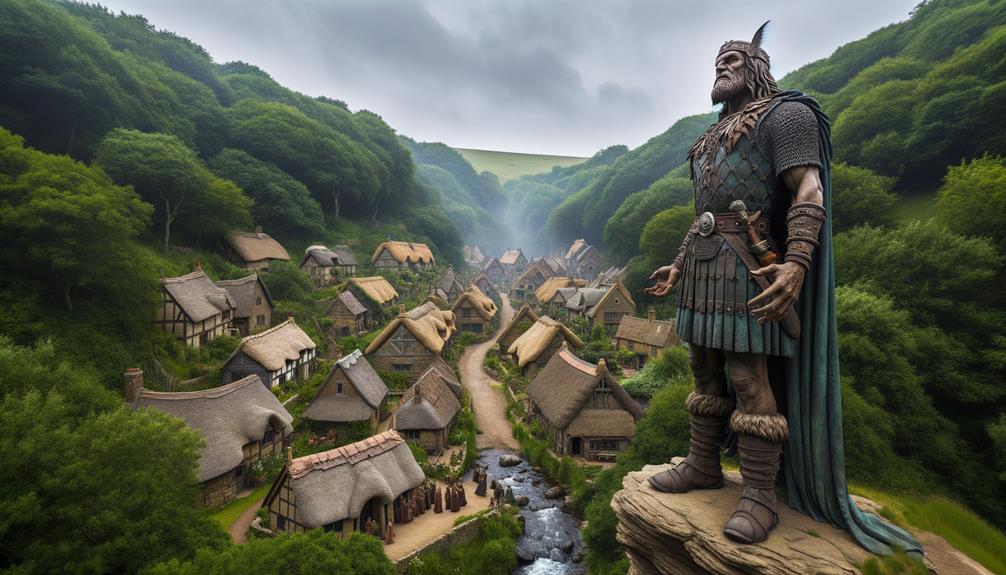
Understand the Impact of Anglo-Saxon Culture through Beowulf
Tracing the connection between Beowulf's gallant deeds and the overall Anglo-Saxon culture, it's evident that the societal standards and principles of that epoch were instrumental in shaping his depiction. Beowulf's rise to the throne of the Geats is a clear reflection of the Anglo-Saxon view of ideal kingship. His triumphant encounters with Grendel's mother and the beast Grendel in Heorot, the Danish king's abode, underscore his heroism – a quality deeply admired in the Anglo-Saxon society. Beowulf's embodiment of an epic hero signifies the ethos and customs of the Anglo-Saxon period, making this literary piece an iconic epic.
| Anglo-Saxon Virtue | Beowulf's Embodiment |
|---|---|
| Heroism | Prevails in battles against Grendel and his mother |
| Kingship | Ascends to be a revered king of the Geats |
| Valor | Defends the Danish king in Heorot |
These correlations not only establish Beowulf as a personification of an Anglo-Saxon hero but also illustrate the culture's influence on the narrative and comprehension of this epic hero. The societal expectations and values of his time undeniably molded Beowulf's heroic undertakings, thereby transforming him into a symbol of Anglo-Saxon culture.
Discover the Essence of Anglo-Saxon Culture through Beowulf's Heroic Feats
From the realm of Beowulf's adventures, we can glean a deeper understanding of the Anglo-Saxon world. His story is a mirror, reflecting the values and beliefs of the era. Not only does Beowulf embody the virtues of a king, but his valiant battles against Grendel and his mother also demonstrate the society's admiration for bravery and heroism. These exploits are not just thrilling narratives – they are the embodiment of the values of the Anglo-Saxon era.
Experience the Richness of Anglo-Saxon Culture in Beowulf's Epic Journey
The tale of Beowulf is more than just an exciting epic – it's a journey through the essence of Anglo-Saxon culture. Beowulf's heroic feats, his rise to kingship, and his valorous battles against formidable foes are all reflections of the societal norms and values of that time. This epic tale provides a window into the Anglo-Saxon world, making Beowulf an enduring symbol of this remarkable era.
This interpretation of Beowulf's character and his heroic deeds offers an engaging and detailed exploration of Anglo-Saxon culture. Dive into this epic journey to uncover the richness of an era that continues to influence our understanding of heroism and valor.
Beowulf's Legendary Battles
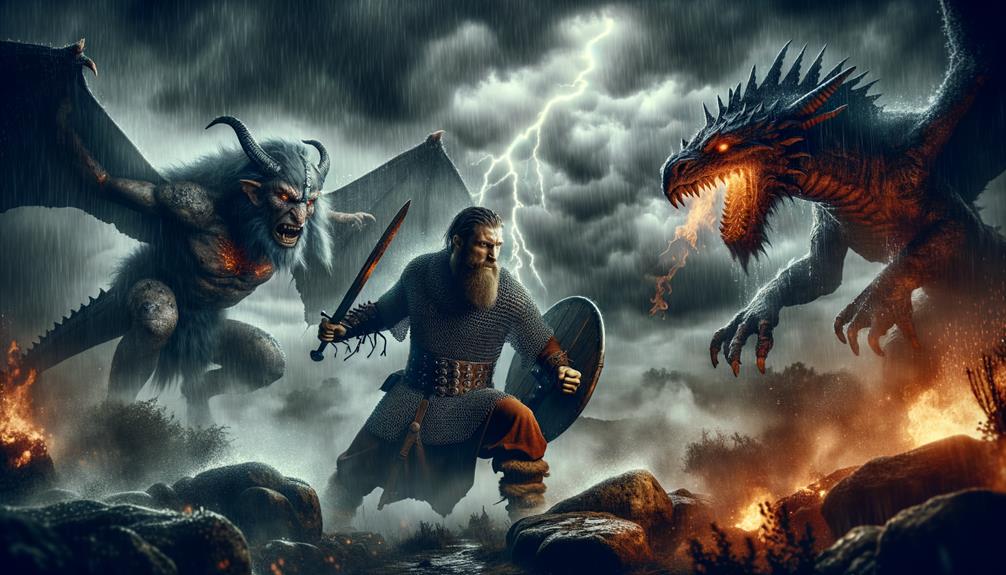
The Epic Battles of Beowulf: A Testament to Legendary Bravery
Immerse yourself in the awe-inspiring tales of Beowulf's legendary battles. Here, we gain insight into his extraordinary strength, unparalleled bravery, and unmatched warrior prowess. These qualities not only define Beowulf as an epic hero but also mirror the esteemed virtues of the Anglo-Saxon era.
Beowulf vs. Grendel: A Fight of Monumental Proportions
Our journey begins with Beowulf's first epic encounter against Grendel, the fearsome monster wreaking havoc among the Danes. With nothing more than his bare hands, Beowulf vanquishes Grendel, demonstrating an impressive display of brute strength and courage.
Facing Grendel's Mother: Venturing Beyond Native Geatland
Our saga continues with Beowulf's second legendary fight, this time against Grendel's mother. Venturing far beyond his native Geatland to aid the Danes, Beowulf's heroism transcends borders. This act of courage exemplifies the true essence of an epic hero.
The Final Battle: An 81-Year-Old Hero vs. A Dragon
Fast forward to an 81-year-old Beowulf, still radiating strength and bravery, proving age is no barrier to heroism. Despite suffering a mortal wound, he valiantly engages in his final battle, slaying a dragon. This act further cements his legacy as an epic hero.
Beowulf: The Quintessential Epic Hero
This English tale of immense bravery and strength serves as a striking example of the traits greatly valued during the Anglo-Saxon era. Beowulf, through his legendary battles, embodies the true definition of an epic hero. His story is a testament to the heroic virtues of strength, bravery, and selflessness, making it a compelling read for anyone interested in the rich tapestry of Anglo-Saxon literature.
Interpretation and Criticism of Beowulf
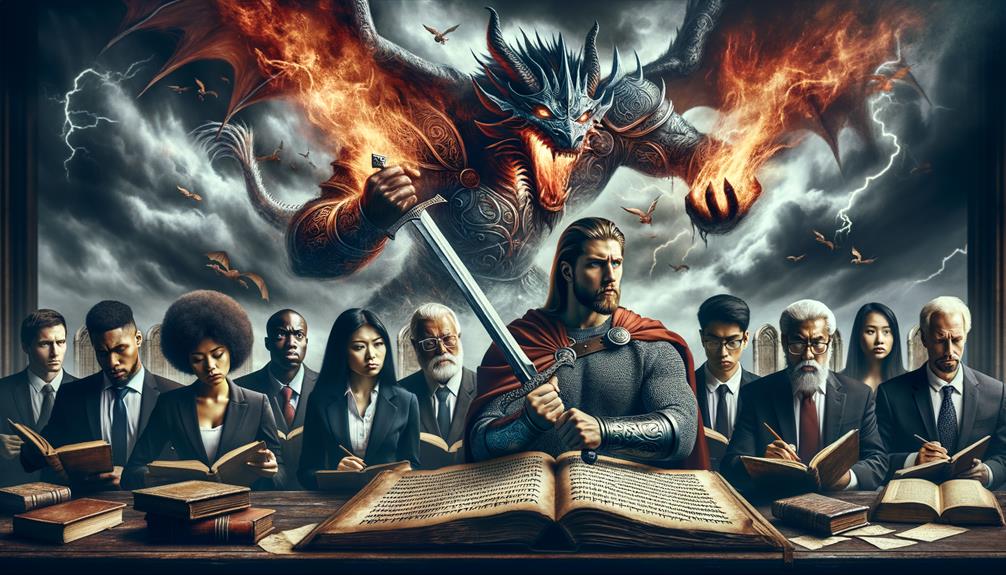
Beowulf: An Epic Hero's Interpretation and Criticism
Diving into the heart of the timeless Anglo-Saxon classic, Beowulf, we find a hero whose legendary battles paint a vivid picture of epic heroism. The narrative follows Beowulf, a young warrior who ascends to the Danish throne after a 12-year reign. His epic journey includes a deadly encounter with a dragon, symbolizing the climax of his heroic saga and marking the end of an era.
Between Courage and Fate: Beowulf's Heroic Path
A striking aspect of Beowulf's interpretation is the stark contrast between his undaunted valor and the impending doom of fate. Grendel, portrayed as a repugnant beast, embodies the lurking darkness and inherent peril in Beowulf's heroic journey. Yet, as Beowulf asserts, *"Fate often saves an undoomed man when his courage is good,"* he echoes the Anglo-Saxon faith in the potency of personal will and the flexibility of destiny.
Tragic Flaw or Unwavering Heroism?
Critics often debate Beowulf's decision to confront the dragon unarmed, resulting in his fatal end. Some view this as his tragic flaw – an overbearing pride. Yet, others celebrate this as a testament to his unyielding heroism, displaying his resolve to meet his fate with courage and dignity.
Conclusion
In essence, the interpretation and criticism of Beowulf offer a rich tapestry of insights into the character's heroic journey and the Anglo-Saxon ethos. This timeless classic continues to captivate audiences, providing a lens to explore themes of heroism, fate, and courage. It's a must-read for anyone interested in literature, history, or the human spirit's resilience.
Frequently Asked Questions
What Makes Beowulf an Anglo-Saxon Hero?
Understanding Beowulf: The Quintessential Anglo-Saxon Hero
In the grand tapestry of literature, Beowulf emerges as the quintessential Anglo-Saxon hero. His tale, steeped in bravery and fortitude, has captivated audiences for centuries. Let's dive deeper into what truly defines him as this revered archetype.
Born from Nobility, Destined to Lead
Beowulf's story begins with his noble birth – a powerful testament to his destined greatness. This lineage, however, is merely the foundation for his heroic stature. His noble bloodline does not merely command respect, but sets the stage for his exceptional leadership. Far from being just a hero, he is a beloved king, held in high esteem by his people.
Unmatched Strength: The Powerhouse of Anglo-Saxon Era
Beowulf's strength is unrivaled, a characteristic that's central to his heroic identity. His might, both physical and mental, is a beacon of hope for his people. It is this unmatched power that sets him apart, marking him as a true Anglo-Saxon hero.
Exceptional Warrior Skills: The Ultimate Battleground Tactician
Beyond his strength, Beowulf also boasts exceptional warrior skills. His prowess in battle is not only a testament to his physical abilities but also showcases his strategic acumen. His victories aren't merely the product of brute force, but a combination of strength, skill, and intellect.
A Willingness to Aid Others: The Heart of a True Hero
A hero is not defined by strength alone, but also by their willingness to aid others. Beowulf exemplifies this trait, always ready to lend a hand and defend his people. This selfless dedication paints him as more than a warrior or a king, but a true hero.
In Summary: Beowulf, A Timeless Anglo-Saxon Hero
To say Beowulf is an Anglo-Saxon hero is an understatement. He is the embodiment of nobility, strength, skill, and selflessness. More than just a hero, he is a revered king, a beacon of hope, and a symbol of strength for his people. Beowulf's tale is a shining example of the heroic ideal in Anglo-Saxon literature, a testament to the enduring allure of his character.
In essence, Beowulf is not just a character, but a symbol of the values cherished by the Anglo-Saxon culture: courage, fortitude, and unwavering dedication to the community. His tale is a powerful reminder of these timeless values, making him a true Anglo-Saxon hero.
Who Is the Epic Hero in Beowulf?
Understanding the Epic Hero in Beowulf: A Closer Look
In the captivating narrative of Beowulf, the protagonist, Beowulf himself, proudly stands as the quintessential epic hero. His heroism isn't just about wielding a mighty sword or wearing a crown; it's about being a beacon of hope, a defender of his people, and an icon of bravery.
Beowulf: The Warrior, King, and Savior
Beowulf's multi-faceted persona is what truly sets him apart. His prowess as a warrior is legendary, fearlessly locking horns with monstrous beings. As a king, he rules with wisdom and valor, leading his kingdom towards prosperity. However, it's his role as a savior that truly cements his status as an epic hero. His daring exploits and grand adventures paint a vivid picture of a man who would stop at nothing to protect his people.
Defining Heroism through Beowulf
Heroism, as depicted in Beowulf, isn't about the triumph of good over evil alone. It's about rising to the occasion, taking on seemingly insurmountable challenges, and never backing down. It's about embodying the spirit of perseverance, courage, and resilience. In this context, Beowulf isn't just a hero; he's the epitome of heroism itself.
As readers, we can draw inspiration from Beowulf's heroism, applying his lessons of courage and resilience in our own lives. Whether it's facing a challenging work project, standing up for what's right, or persevering through personal hardships, we can all channel our inner Beowulf.
Key Takeaways: Beowulf's Heroism
In conclusion, Beowulf's character is a masterclass in epic heroism. His bravery, leadership, and devotion to his people are all hallmarks of his heroic persona. He sets the gold standard for epic heroes, teaching us that true heroism is about much more than just slaying monsters.
Remember, it's not just about being a hero; it's about being a Beowulf.
*Beowulf's heroism is not only about his victories in battles, but also about his dedication to his people, his courage in the face of adversity, and his unwavering commitment to justice. Be bold. Be brave. Be a Beowulf.*
Who Are the Two Heroes in Beowulf?
Beowulf and Wiglaf: The Dynamic Duo in Beowulf
Remember the legendary Geat warrior and ruler, Beowulf? How about his steadfast thane, Wiglaf? Well, in the epic saga of Beowulf, these two prove themselves as unforgettable heroes.
Beowulf, the renowned Geat protagonist, is not just a warrior but a king who commands respect and admiration. His fearless exploits have been celebrated in songs and stories, making him a celebrated figure in the annals of literature.
On the other hand, Wiglaf may not initially stand out as the hero of the story. But when the narrative unfolds, his loyalty and bravery shine through. He steps forward when it matters most, showing his own heroic spirit by supporting Beowulf in his final, epic battle.
These two characters symbolize the true essence of heroism in Beowulf. Their courage, loyalty, and selflessness exemplify the virtues that define a hero, making them fascinating and inspiring figures for readers.
Beowulf and Wiglaf: Heroes to Remember
So, next time you're discussing Beowulf, don't just remember the mighty Geat king. Remember Wiglaf too, the loyal thane who proved his mettle when it counted the most.
Their actions not only shape the narrative but also provide a profound lesson about heroism and loyalty. These two heroes remind us that bravery is not just about physical strength but also about standing up for what's right, even when the odds are against you.
How Would You Describe Beowulf?
Beowulf: A Paragon of Strength and Courage
Beowulf, a legendary character, epitomizes the essence of bravery and physical prowess. His gallant deeds on the battlefield, coupled with a distinguished family background, elevate his stature in the warrior-centric society he belongs to. This courageous figure, celebrated for his heroic exploits, stands as an embodiment of a revered warrior in his society.
Delving Into Beowulf's Heroic Feats
Let's take a deep dive into Beowulf's heroic feats. Not just any warrior, Beowulf is a paragon of strength and valour, revered for his might in combat. From vanquishing the monstrous Grendel to confronting the dragon, Beowulf's heroics resonate with audacious courage and unmatched strength. His noble lineage echoes a legacy of warriors, further cementing his legendary status.
A Leader Admired By All
An essential aspect of Beowulf's persona is the respect and admiration he garners from his peers. His warrior society, bound by the code of honour and bravery, holds him in high esteem. His actions, driven by a sense of duty and courage, inspire awe and respect within his warrior community. This admiration underscores his role as a revered figure in his society.
Why Beowulf Rings True Today
Even in the modern age, Beowulf's story serves as an inspiration. His character embodies timeless virtues of bravery, strength, and leadership, which are still revered today. In a world where heroes are often defined by their physical strength and courage, Beowulf stands as a beacon of true heroism, reminding us that heroism is not just about physical prowess, but also about the strength of character.

